Tutormuthoni
On this page, you find all documents, package deals, and flashcards offered by seller tutormuthoni.
- 97
- 0
- 10
Community
- Followers
- Following
107 items
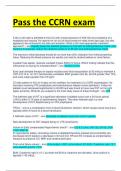
Pass the CCRN exam
Pass the CCRN exam A 56 yr-old male is admitted to the ICU with a blood pressure of 225/135 and complains of a headache and nausea. He reports he ran out of blood pressure meds three days ago, but also appears to be confused to the date and situation. What is the most appropriate treatment approach? - ans-Rapidly lower the diastolic pressure to 100 with IV antihypertensive meds, then continue to gradually reduce the diastolic pressure to 85 with oral antihypertensive meds. The maximum...
- Exam (elaborations)
- • 41 pages •
Pass the CCRN exam A 56 yr-old male is admitted to the ICU with a blood pressure of 225/135 and complains of a headache and nausea. He reports he ran out of blood pressure meds three days ago, but also appears to be confused to the date and situation. What is the most appropriate treatment approach? - ans-Rapidly lower the diastolic pressure to 100 with IV antihypertensive meds, then continue to gradually reduce the diastolic pressure to 85 with oral antihypertensive meds. The maximum...

PATHO 370 GUIZ 2 GUARANTEED PASS
PATHO 370 GUIZ 2 GUARANTEED PASS What is gastritis? - ans-inflammation of the stomach lining What is acute gastritis? - ans-Precipitated by ingestion of irritating substances Ex: alcohol and aspirin, NSAIDS, viral bacteria, autoimmune What is caused by Chronic gastritis? - ans-H. pyloric (can live in acidic environments) What are the complications of Chronic Gastritis - ans-peptic ulcers, gastric adenocarcinoma What are the causes of peptic ulcers disease? - ans-NSAIDS, Stre...
- Exam (elaborations)
- • 9 pages •
PATHO 370 GUIZ 2 GUARANTEED PASS What is gastritis? - ans-inflammation of the stomach lining What is acute gastritis? - ans-Precipitated by ingestion of irritating substances Ex: alcohol and aspirin, NSAIDS, viral bacteria, autoimmune What is caused by Chronic gastritis? - ans-H. pyloric (can live in acidic environments) What are the complications of Chronic Gastritis - ans-peptic ulcers, gastric adenocarcinoma What are the causes of peptic ulcers disease? - ans-NSAIDS, Stre...

ATI CAPSTONE FUNDAMENTALS EXAM 2024 GUARANTEED PASS.
ATI CAPSTONE FUNDAMENTALS EXAM 2024 GUARANTEED PASS. A nurse is assessing a client who has Parkinsons disease, what manifestations should be expected? -bradykinesia A nurse is caring for a client receiving radiation treatments for cancer. the client states he is experiencing dryness, redness, and scaling at the treatment area. which of the following should the nurse instruct the client to do? -liberally apply prescribed lotion to the area A nurse is assessing the pain level of a clie...
- Package deal
- Exam (elaborations)
- • 9 pages •
ATI CAPSTONE FUNDAMENTALS EXAM 2024 GUARANTEED PASS. A nurse is assessing a client who has Parkinsons disease, what manifestations should be expected? -bradykinesia A nurse is caring for a client receiving radiation treatments for cancer. the client states he is experiencing dryness, redness, and scaling at the treatment area. which of the following should the nurse instruct the client to do? -liberally apply prescribed lotion to the area A nurse is assessing the pain level of a clie...
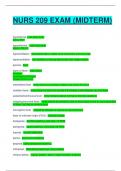
NURS 209 EXAM (MIDTERM)
NURS 209 EXAM (MIDTERM) hypothermia - low body temp below 96 F hyperthermia - high body temp above 100.4 F hypoventilation - decreased rate or depth of air movement into the lungs hyperventilation - the condition of taking abnormally fast, deep breaths pyrexia - fever types of fever - intermittent remittent sustained/continuous relapsing/recurrent intermittent fever - temp returns to normal at least once every 24 hours remittent fever - temp does not return to...
- Exam (elaborations)
- • 9 pages •
NURS 209 EXAM (MIDTERM) hypothermia - low body temp below 96 F hyperthermia - high body temp above 100.4 F hypoventilation - decreased rate or depth of air movement into the lungs hyperventilation - the condition of taking abnormally fast, deep breaths pyrexia - fever types of fever - intermittent remittent sustained/continuous relapsing/recurrent intermittent fever - temp returns to normal at least once every 24 hours remittent fever - temp does not return to...
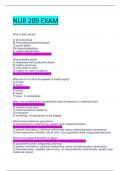
NUR 209 EXAM
NUR 209 EXAM What is elder abuse? A) physical abuse B) Psychological/emotional abuse C) sexual abuse D)Financial exploitation E) neglect/abandonment F) all of the above - All of the above What is heathy aging? A) independent and productive citizens B) healthy active lives C) care closer to come D) support for unpaid caregivers E) all of the above - all of the above What one is not one of the aspects of healthy aging? A) access B) quality C) acceptability D) choic...
- Package deal
- Exam (elaborations)
- • 28 pages •
NUR 209 EXAM What is elder abuse? A) physical abuse B) Psychological/emotional abuse C) sexual abuse D)Financial exploitation E) neglect/abandonment F) all of the above - All of the above What is heathy aging? A) independent and productive citizens B) healthy active lives C) care closer to come D) support for unpaid caregivers E) all of the above - all of the above What one is not one of the aspects of healthy aging? A) access B) quality C) acceptability D) choic...
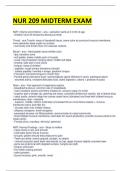
NUR 209 MIDTERM EXAM
NUR 209 MIDTERM EXAM NMT: Infants and Children - ans-- salivation starts at 3 mnth of age - children have 20 temporary deciduous teeth Throat - ans-Tonsils: mass of lymphoid tissue, same color as surround muscus membrane, more glandular deep crypts on surface - oral cavity and throat have rich vascular network Mouth - ans-- Hard-palate: bone whitish color - lips; transition zone - soft palate: pinker mobile arch of muscle - uvula: free projection hanging down middle soft plate...
- Package deal
- Exam (elaborations)
- • 18 pages •
NUR 209 MIDTERM EXAM NMT: Infants and Children - ans-- salivation starts at 3 mnth of age - children have 20 temporary deciduous teeth Throat - ans-Tonsils: mass of lymphoid tissue, same color as surround muscus membrane, more glandular deep crypts on surface - oral cavity and throat have rich vascular network Mouth - ans-- Hard-palate: bone whitish color - lips; transition zone - soft palate: pinker mobile arch of muscle - uvula: free projection hanging down middle soft plate...
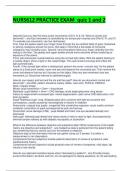
NURS612 PRACTICE EXAM quiz 1 and 2
NURS612 PRACTICE EXAM quiz 1 and 2 Describe how you test the extra ocular movements (CN II, IV & VI). What is normal and abnormal? - ans-Eye movement is controlled by six extraocular muscles and CNs III, IV, and VI. To evaluate eye movement, use four techniques: First, have the patient watch your finger move through the six cardinal fields of gaze. Sustained or jerking nystagmus should not occur. But keep in mind that a few beats of horizontal nystagmus may normally occur. Second, have the ...
- Exam (elaborations)
- • 27 pages •
NURS612 PRACTICE EXAM quiz 1 and 2 Describe how you test the extra ocular movements (CN II, IV & VI). What is normal and abnormal? - ans-Eye movement is controlled by six extraocular muscles and CNs III, IV, and VI. To evaluate eye movement, use four techniques: First, have the patient watch your finger move through the six cardinal fields of gaze. Sustained or jerking nystagmus should not occur. But keep in mind that a few beats of horizontal nystagmus may normally occur. Second, have the ...
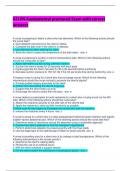
ATI PN Fundamental proctored Exam with correct answers
ATI PN Fundamental proctored Exam with correct answers A nurse is preparing to bathe a client who has dementia. Which of the following actions should the nurse take? a. Give detailed instructions for the client to follow. b. Complete the bath even if the client is in distress. c. Use distractions when bathing the client. d. Allow the client to select the temperature of the bath water. -ans- c A nurse is preparing to suction a client's tracheostomy tube. Which of the following actions ...
- Exam (elaborations)
- • 25 pages •
ATI PN Fundamental proctored Exam with correct answers A nurse is preparing to bathe a client who has dementia. Which of the following actions should the nurse take? a. Give detailed instructions for the client to follow. b. Complete the bath even if the client is in distress. c. Use distractions when bathing the client. d. Allow the client to select the temperature of the bath water. -ans- c A nurse is preparing to suction a client's tracheostomy tube. Which of the following actions ...
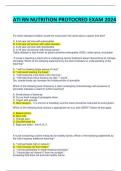
ATI RN NUTRITION PROTOCRED EXAM 2024
ATI RN NUTRITION PROTOCRED EXAM 2024 For which disease/condition would the nurse teach the client about a gluten-free diet? A. A 54 year old man with pancreatitis. B. A 32 year old woman with celiac disease. C. A 22 year old man with diverticulitis. D. A 76 year old woman with breast cancer. Celiac disease is also known as gluten-sensitive enteropathy (GSE), celiac sprue, and gluten A nurse is teaching a client who is undergoing cancer treatment about interventions to manage st...
- Exam (elaborations)
- • 37 pages •
ATI RN NUTRITION PROTOCRED EXAM 2024 For which disease/condition would the nurse teach the client about a gluten-free diet? A. A 54 year old man with pancreatitis. B. A 32 year old woman with celiac disease. C. A 22 year old man with diverticulitis. D. A 76 year old woman with breast cancer. Celiac disease is also known as gluten-sensitive enteropathy (GSE), celiac sprue, and gluten A nurse is teaching a client who is undergoing cancer treatment about interventions to manage st...
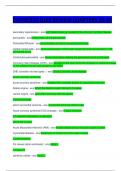
PATHO370 QUIZ REVIEW CHAPTERS 16-20
PATHO370 QUIZ REVIEW CHAPTERS 16-20 secondary hypertension - ans-high blood pressure caused by the effects of another disease pericarditis - ans-inflammation of the pericardium Pericardial Effusion - ans-accumulation of fluid in the pericardial cavity cardiac tamponade - ans-acute compression of the heart caused by fluid accumulation in the pericardial cavity Constrictive pericarditis - ans-fibrous scar tissue making the pericardium stick to the heart Coronary Heart Disease (...
- Exam (elaborations)
- • 13 pages •
PATHO370 QUIZ REVIEW CHAPTERS 16-20 secondary hypertension - ans-high blood pressure caused by the effects of another disease pericarditis - ans-inflammation of the pericardium Pericardial Effusion - ans-accumulation of fluid in the pericardial cavity cardiac tamponade - ans-acute compression of the heart caused by fluid accumulation in the pericardial cavity Constrictive pericarditis - ans-fibrous scar tissue making the pericardium stick to the heart Coronary Heart Disease (...
